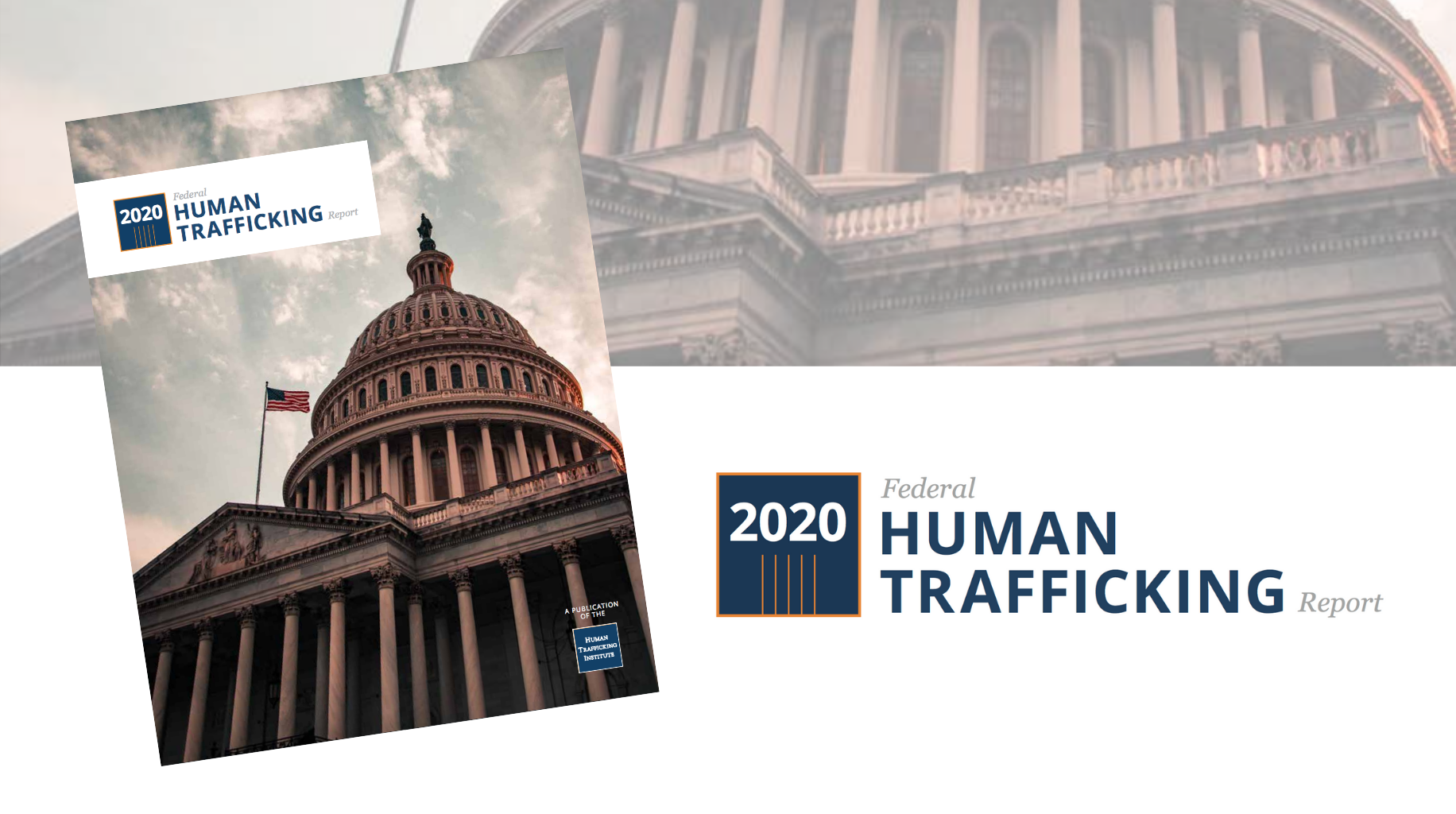The 2020 Federal Human Trafficking Report was released today on our website. The Report, a project of HTI, is a continuation of HTI’s efforts to provide comprehensive and objective data about every criminal and civil human trafficking case that federal courts handle each year. For the first time, the 2020 Report compiles data from every federal human trafficking prosecution since 2000, the year the landmark Trafficking Victims Protection Act was passed into law.
In 2020, there were a total of 579 criminal human trafficking cases in U.S. federal courts (including new cases, pending cases, and cases on appeal) with a total of 1,007 active criminal defendants–104 of those were buyer defendants who were charged with purchasing (or attempting to purchase) commercial sex. There were also 183 defendants convicted with an average prison sentence of 156 months, or 12 years. This year, the Report features a number of new data points on human trafficking schemes and prosecutions, including websites and social media platforms used to recruit victims, the nationality of foreign national victims, modes of transportation used to facilitate trafficking, and increased data on human trafficking investigations, including case referrals and multi-agency collaboration. Human trafficking is an economically-motivated crime committed by traffickers who compel victims to work or to engage in commercial sex acts. U.S. federal law criminalizes human trafficking and provides protections for victims. An effective public justice system is an essential part of a victim-centered and trauma-informed approach to handling trafficking cases.
“This year’s Report provides in-depth trend analyses and important context on 20 years’ worth of enforcement data that practitioners and the public alike can review to assess how far we’ve come in using the justice system to combat trafficking, and how far we still have to go.” Lindsey Roberson, Director of Legal Engagement and 2020 Report Editor
The 2020 Report highlights data and trends spanning two decades of anti-trafficking enforcement in the United States in honor of the 20th anniversary of the Trafficking Victims Protection Act (TVPA). The Report is the first source to compile data from all criminal cases from each year since the TVPA was enacted. Throughout the Report, you will find a series of blue feature boxes entitled “20 Year Trends,” which provide a snapshot of how human trafficking schemes and prosecutions have evolved since 2000.
“The 2020 Federal Human Trafficking Report provides policymakers, researchers, journalists, and nonprofit leaders with an essential tool to analyze the U.S. enforcement of anti-trafficking laws. One government leader described it as the most reliable cross-section of human trafficking data within the United States. The 2020 Report fills a major gap in data collection to support trafficking prosecutions by presenting prosecution trends since 2000. Our goal is to continue to fill the gaps in these efforts and provide a vision for this type of data collection in other countries.” Victor Boutros, Chief Executive Officer
Key Takeaways from 2020:
- In 2020, there were 579 active human trafficking prosecutions involving 1,007 active defendants and impacting over 1,499 victims. 94% of these were sex trafficking cases and 6% were forced labor cases.
- Prosecutors filed more human trafficking cases in 2020 than in 2019, but charged fewer defendants. The number of cases filed in 2020 increased 11% to 165 following two years of decline. In contrast, the number of defendants charged dropped to 257, down 8% from 2019.
- The internet is a major platform for traffickers to recruit sex trafficking victims and solicit buyers of commercial sex. In 2020, 83% of active sex trafficking cases involved the internet as the primary method of solicitation and 41% of victims in active sex trafficking cases were recruited online.
- Self-reporting by a victim was the most common way that a case was reported to law enforcement in 2020. Over one-third of case referrals that resulted in a prosecution involved a victim who contacted law enforcement for assistance, either directly or through the support of a non-profit or hotline.
- Federal courts convicted the lowest number of defendants in human trafficking cases in 2020 since 2012. In 2020, 163 defendants were convicted—an 89% conviction rate. This is a 51% decline in convicted defendants from 2019.
- 2020 saw the highest average sentence imposed in human trafficking cases since the enactment of the TVPA. On average, federal courts sentenced defendants convicted in human trafficking cases to 13 years in prison.
- Federal courts ordered 50% of convicted defendants to pay mandatory restitution in 2020, doubling the percentage of defendants ordered to pay mandatory restitution in 2017.
The 2020 Federal Human Trafficking Report’s findings are not a prevalence estimate of trafficking in the United States, but instead serve as an objective summary of how the federal justice system holds traffickers accountable for their exploitative conduct. The Report does not capture data from state prosecutions, state civil suits, or human trafficking cases that are not prosecuted. A team of seven attorneys and eight law school students reviewed every human trafficking case in the federal court system in 2020. Court documents, press releases, and news sources were reviewed, and prosecutors across the country were consulted, to gather a comprehensive set of data that includes: type of trafficking case, profile of the trafficker, details about the trafficking scheme, demographics of the victim, and district where the case took place, among others. The complete report can be downloaded here.




